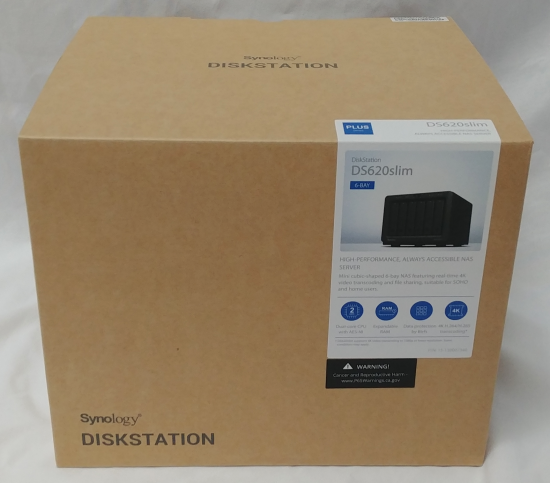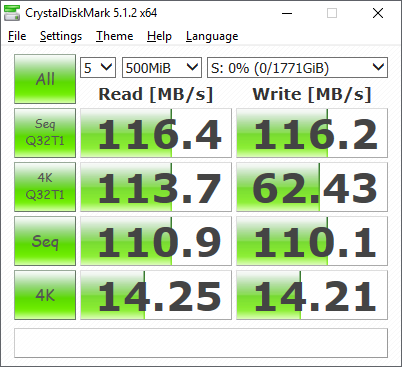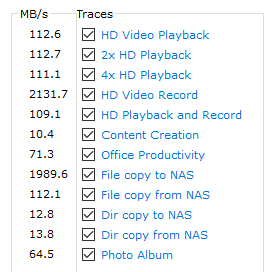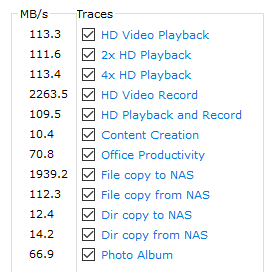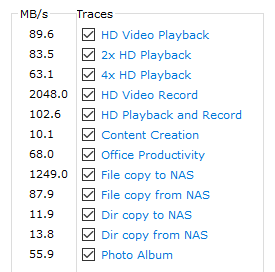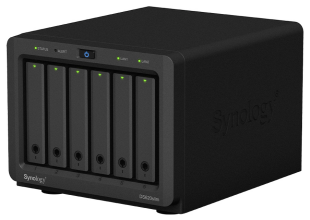

Model: Synology DiskStation DS620slim 6-Bay NAS Server
Manufacturer: Synology
Provided By: Synology
As one of the biggest names in the network-attached storage (NAS) industry, Synology doesn't need much of an introduction. Founded in 2000 by two former Microsoft employees, this Taiwanese company creates network-attached storage, IP surveillance solutions and network equipment for the home and small to medium sized business markets. By taking full advantage of the latest technologies, Synology aims to help users centralize data storage and backup, share files on-the-go, implement professional surveillance solutions, and manage network in reliable and affordable ways.
Earlier this year, Synology unveiled its new 6-bay NAS, the DiskStation DS620slim. Designed for home and small business use, this ultra-compact NAS is powered by an Intel Celeron J3355 dual-core 2.0 GHz processor and is equipped with 2GB of DDR3L memory, dual USB 3.0 ports and a pair of gigabit Ethernet ports. With these specs, the DS620slim is able to do real-time 4K video transcoding and deliver up to 226 MB/s read and 198 MB/s write speeds, even with encryption enabled. The DS620slim also runs the latest version of Synology's award-winning DiskStation Manager (DSM) operating system which offers a wide range of applications for cross-platform file sharing, data backups, cloud synchronization and multimedia streaming.
| Synology DiskStation DS620slim 6-Bay NAS Server | ||||||||||||||||||||||||
|
Needless to say, this is only a taste of what Synology's mini-sized NAS has to offer. To give you an idea of what to expect, we'll take a look at the DS620slim's features and then put it through its paces to see how it performs. Does Synology's new 6-bay NAS have what it takes? Keep reading as we find out.
What's in the box?:
The DiskStation DS620slim comes in a small, brown box. Along with a picture of the unit, the sticker on the front advertises many of its key features including its 6-bays, dual-core processor, expandable RAM, data protection by Btrfs and 4K H.264/H.265 transcoding. The back of the box provides a bit more information regarding the DS620slim's physical features as well as the package contents.
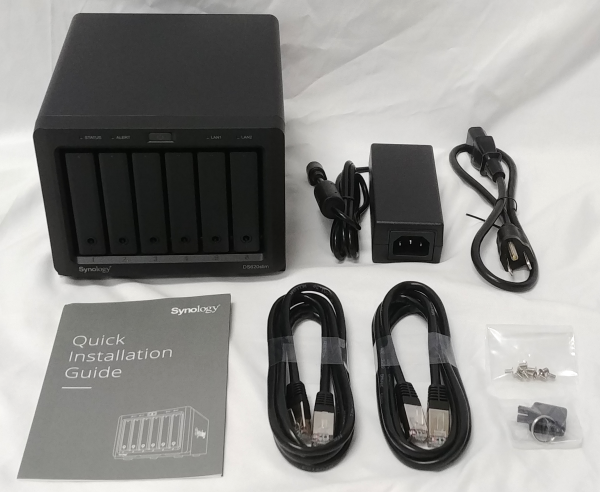
Inside the box you'll find the DS620slim as well as an AC power cord and adapter, two ethernet cables, quick installation guide, a bag of screws and a couple of keys for the drive bays.
Physical Features:
The look of the DS620slim is very similar to Synology's other desktop NAS servers. Designed for home and small business environments, the device is constructed out of black plastic and measures 121 x 151 x 175 mm. The DS620slim also tips the scales at 1.4 kg without any hard drives installed.

Along with its six, 2.5" drive bays, the front of the DS620slim has a series of LED indicators. These LED's are used to show the current state of the hard drives, network, and if there are any alerts regarding the fan or the temperature. The brightness of these LEDs can be adjusted or turned off altogether through the control panel within DiskStation Manager (DSM).

The rear of the DS620slim is pretty straight forward. To keep the hard drives cool, the NAS is equipped with a single 80mm fan. While the fan doesn't appear to be temperature controlled, you can control its speed from within DiskStation Manager. Below the fan, you can see the DS620slim's power connector, two gigabit ethernet ports and a pair of USB 3.0 ports. These USB ports can be used to connect external storage devices, printers and other devices to the NAS.
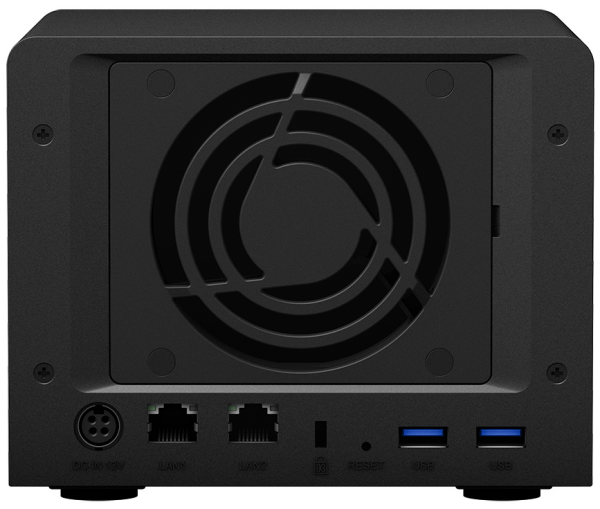
Upgrading the memory on the DS620slim is pretty straightforward. To access the RAM slots, you'll need to remove a handful of screws and then pop off the bottom panel.
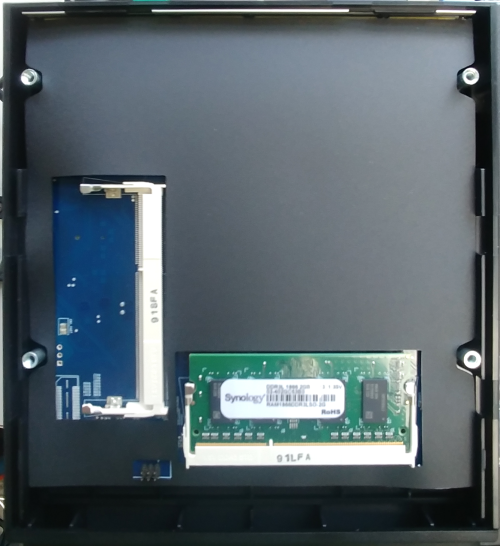
Before using the DS620slim you will need to install a couple of hard drives or SSDs. To begin, remove the six trays from the device and mount the drives to them using the included screws. When you are done, slide the trays back into the empty drive bays.

With the hard drives installed, you can now connect the AC adapter and network cable and turn the DS620slim on. The device's power LED will flash for a few minutes and then will beep and light up a solid blue to indicate that it has started up successfully.
Next, you will need to configure the DS620slim. If you have a DHCP server on your network and you know what IP the NAS is using, you can skip the next few steps and connect directly to the web assistant. Otherwise, you'll need to download and install the Synology Assistant utility.

The Assistant utility searches the network looking for Synology NAS devices as well as those running the company's Disk Station Manager (DSM) operating system like the DS620slim. When it finds one, it will display its host name, IP address, MAC address, model, firmware version and status. To configure the device, select it from the list and click "Connect." The Assistant utility will then launch your default browser and automatically connect you to the web assistant so that you can go through the setup process.

The unit that Synology sent us came with a couple of SSDs pre-installed so I did not have to setup Disk Station Manager (DSM) from scratch. The only thing I needed to do was login using the default administrator account and set up QuickConnect.

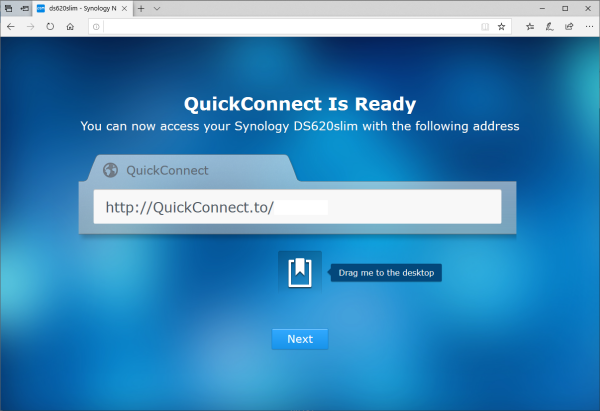
For whatever reason, the web assistant does not configure the DS620slim's storage. As a result, you will need to login to DiskStation Manager and create at least one volume before it can be used to share files.
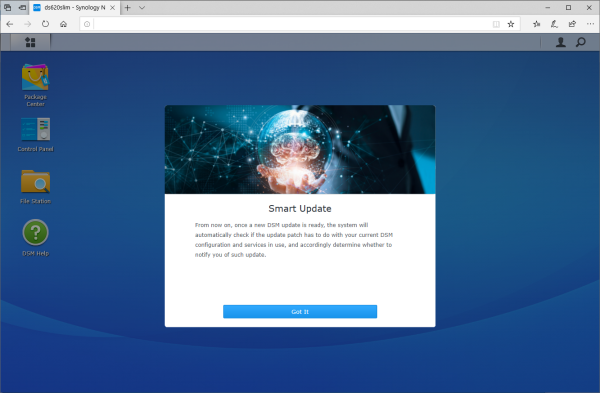
Creating a volume on the DS620slim is pretty straight forward. The Volume Creation Wizard gives you two creation methods: Quick and Custom. The Quick option is recommended if you're short on time or you want to simplify your storage management. This option creates an SHR (Synology Hybrid RAID) volume and will automatically optimize capacity and performance based on member hard disks. If you're looking for more precise control of your storage, you'll want to go with the Custom option which offers support for different RAID types and lets you create single or multiple volumes.
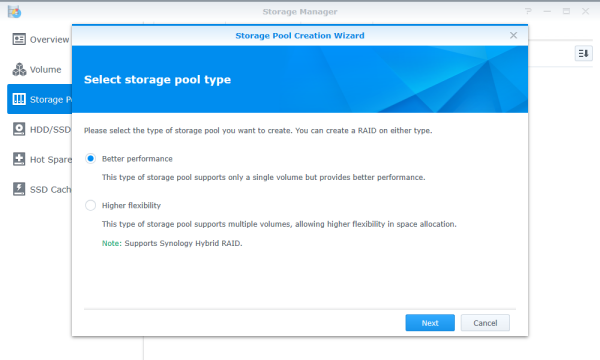
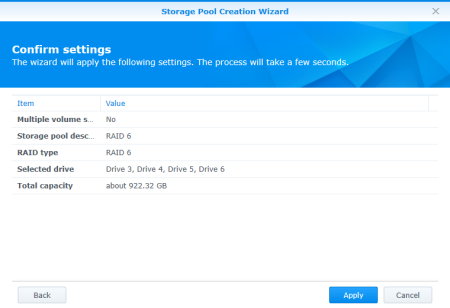
Synology is continuously improving its DiskStation Manager operating system. To take advantage of the latest fixes and features, you will need to update the DS620slim's firmware. This can be done by uploading a firmware image file or through DSM's automatic update feature.
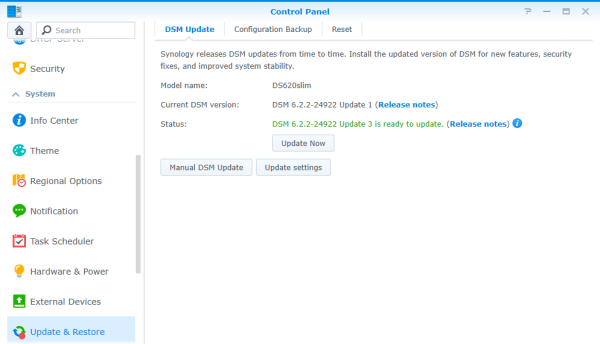
While intended for home and small business use, the DS620slim has many of the same features as Synology's higher end offerings. Its Linux-based DiskStation Manager (DSM) operating system offers cross platform file sharing over various network protocols including SMB, AFP and NFS. The DS620slim also offers support for multiple RAID types, iSCSI and domain authentication.
| General DSM Specification | |
| Networking Protocol | SMB, AFP, NFS, FTP, WebDAV, CalDAV, iSCSI, Telnet, SSH, SNMP, VPN (PPTP, OpenVPN, L2TP) |
| File System | • Internal: Btrfs, ext4 • External: Btrfs, ext4, ext3, FAT, NTFS, HFS+, exFAT2 |
| Supported RAID Type | Synology Hybrid RAID (SHR), Basic, JBOD, RAID 0, RAID 1, RAID 5, RAID 6, RAID 10 |
| Storage Management | • Maximum single volume size: 108 TB • Maximum of system snapshots: 65,5365 • Maximum internal volumes: 64 |
| SSD Cache | Read-write cache support |
| File Sharing Capability | • Maximum local user account: 2,048 • Maximum local group: 256 • Maximum shared folder: 256 • Maximum concurrent SMB/NFS/AFP/FTP connection: 500 |
| Privilege | Windows Access Control List (ACL), application privileges |
| Directory Service | Windows AD integration: Domain users login via SMB/NFS/AFP/FTP/File Station, LDAP integration |
| Virtualization | VMware vSphere 6.5, Microsoft Hyper-V, Citrix, OpenStack |
| Security | Firewall, encryption shared folder, SMB encryption, FTP over SSL/TLS, SFTP, rsync over SSH, login auto block, Let's Encrypt support, HTTPS (customizable cipher suite) |
| Supported Client | Windows 7 and 10, Mac OS X 10.11 onwards |
| Supported Browser | Chrome, Firefox, Edge, Internet Explorer 10 onwards, Safari 10 onwards; Safari (iOS 10 onwards), Chrome (Android 6.0 onwards) on tablets |
| Interface Language | English, Deutsch, Français, Italiano, Español, Dansk, Norsk, Svenska, Nederlands, Русский, Polski, Magyar, Português do Brasil, Português Europeu, Türkçe, Český, 日本語, 한국어, 繁體中文, 简体中文 |
The DS620slim's capabilities can be expanded even further by downloading and installing add-on packages. Within the Package Center, you'll find packages that will let you backup and sync your data, collaborate with others, stream multimedia content and even manage IP cameras deployed within your home.
| File Server & Synchronization | |
| Drive | Provide a universal portal to synchronize your files across various platforms, including Windows, macOS, Linux, Android, and iOS. The built-in universal portal allows you to access data anytime and anywhere. • Maximum number of hosted files: 500,000 • Maximum number of concurrent connections for PC clients: 450 |
| File Station | Virtual drive, remote folder, Windows ACL editor, compressing/extracting archived files, bandwidth control for specific users or groups, creating sharing links, transfer logs |
| FTP Server | Bandwidth control for TCP connections, custom FTP passive port range, anonymous FTP, FTP SSL/TLS and SFTP protocol, boot over the network with TFTP and PXE support, transfer logs |
| Presto File Server | High-speed data transfer over WAN with exclusive SITA technology between Synology NAS and desktop |
| Cloud Sync | One or two-way synchronization with public cloud storage providers including Alibaba Cloud OSS, Amazon Drive, Amazon S3-compatible storage, Backblaze B2, Baidu Cloud, Box, Dropbox, Google Cloud Storage, Google Drive, hubiC, MegaDisk, Microsoft OneDrive, OpenStack Swift-compatible storage, Tencent COS, WebDAV servers, Yandex Disk |
| Universal Search | Offer global search into applications and files |
| iSCSI Storage & Virtualization | |
| iSCSI Manager | • Maximum iSCSI target: 128 • Maximum iSCSI LUN: 256 • iSCSI LUN clone/snapshot support |
| Virtual Machine Manager | Deploy and run various virtual machines on Synology NAS, including Windows, Linux, or Virtual DSM |
| Data Protection & Backup Solution | |
| Hyper Backup | Support local backup, network backup, and data backup to public clouds |
| Backup Tool | DSM configuration backup, macOS Time Machine support, Cloud Station Backup Shared folder sync - maximum task number: 8 |
| Snapshot Replication | • Maximum of shared folder snapshots: 1,024 • Maximum of Replication: 32 |
| Synology High Availability | Reduce service downtime by setting up two identical NAS into one high-availability cluster |
| Active Backup for G Suite Support | G Suite My Drive and Team Drive backup and restoration |
| Active Backup for Office 365 Support | Office 365 OneDrive for Business, mail, contacts, and calendar backup and restoration |
| Active Backup for Business | All-in-one backup solution designed for heterogeneous business IT environment, enabling IT admins to remotely manage and monitor protection over PC, servers and VM on one centralized console |
| Productivity & Collaboration | |
| Collaboration tools | Collaborate with instant message service Synology Chat, online editor Synology Office, and scheduling assistant Synology Calendar • Chat maximum user: 1,000 • Office maximum user: 500 • Calendar supports CalDAV and access via mobile devices |
| Note Station | Rich-text note organization and versioning, encryption, sharing, media embedding and attachments |
| Synology MailPlus Server | Secure, reliable, and private mail solution with high-availability, load balancing, security and filtering design (includes 5 free email account licenses; additional accounts require the purchasing of additional licenses) |
| Synology MailPlus | Intuitive webmail interface for MailPlus Server, customizable mail labels, filters, and user interface |
| Multimedia | |
| Moments | Support smart AI album with facial and subject recognition, photo editing and sharing features, similar photo detection, auto-editing functions such as color correction and angle adjustments, and AI selection of the best photos. Mobile applications are available on iOS and Android devices. |
| Other Packages | Video Station, Photo Station, Audio Station, iTunes Server |
| Surveillance | |
| Surveillance Station | Maximum IP camera: 25 (total of 750 FPS at 720p, H.264) (Including two free camera licenses; additional cameras require the purchasing of additional licenses) |
| All-in-One Server | |
| Synology Directory Server | Provide a flexible and cost-effective domain controller solution |
| CMS | Provide a single interface to manage and monitor multiple Synology NAS |
| VPN Server | Maximum connection: 30, supported VPN protocol: PPTP, OpenVPN, L2TP/IPSec |
| Mail Server | Supported Mail Server protocol: POP3, SMTP, IMAP, support LDAP/AD account |
| Mail Station | Webmail interface for Mail Server to receive emails from multiple POP3 mailboxes, customizable SMTP server |
| Web Station | Virtual host (up to 30 websites), PHP/MariaDB, 3rd-party applications support |
| Other Packages | DNS Server, RADIUS Server, Log Center |
| Others | |
| Storage Analyzer | Volume and quota usage, total size of files, volume usage and trends based on past usage, size of shared folders, large files, most recently modified files, least recently accessed files |
| Antivirus Essential | Full system scan, scheduled scan, white list customization, virus definition auto update |
| Security Adviser | Malware detection/removal, user account/password, network, system-related security scan |
| iOS/Android applications | Synology Drive, Synology MailPlus, DS audio, DS photo, DS video, DS cam, DS file, DS finder, DS note, Moments |
Along with the usual assortment of file sharing services, the DS620slim offers support for Synology Drive. With this application, users can access, manage, synchronize or backup files between their computers, mobile devices and other NAS devices.

Along with a web-based interface, Synology provides clients for most major platforms including Windows, Mac OS, iOS and Android. Take note that the capabilities of these apps vary and, in some cases, you may need to install more than one. For example, the Drive app for Android gives you the ability to access, manage and share your files but is missing the sync feature found in the DS cloud app.
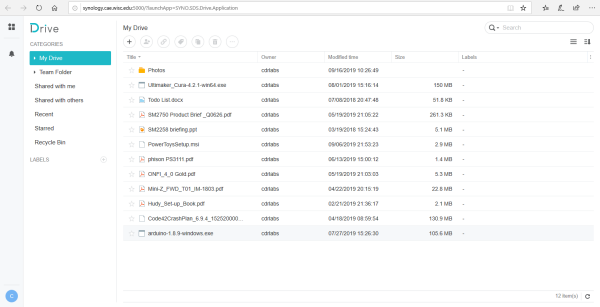


Cloud Sync takes this concept one step further by giving you the ability to seamlessly synchronize and share files between your NAS and public cloud services, such as Dropbox, Google Drive and OneDrive. Its Selective Sync feature also allows you to filter the files or select the folders you want to sync to ensure you have only the files you need on the public cloud service or vice versa.

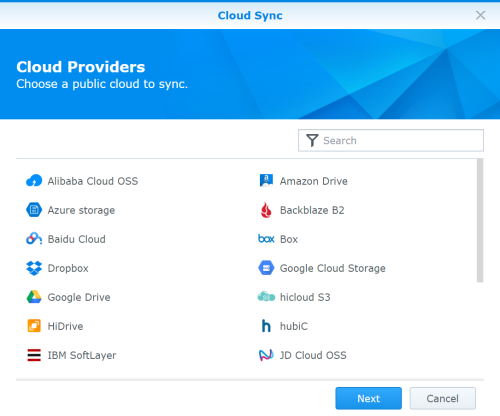
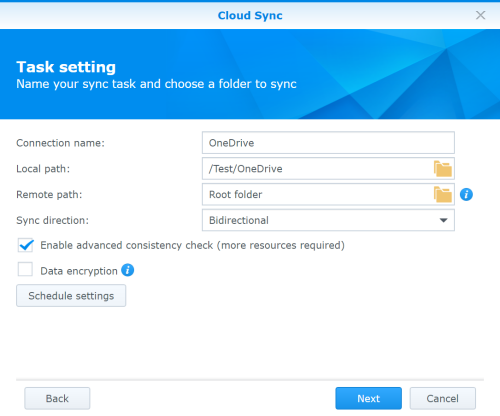
In addition to its file sharing, backup and cloud synchronization capabilities, the DS620slim offers a number of multimedia features that home users should find useful. Using the Package Center, users can install applications like Plex Media Server that will allow them to stream videos, music and photos to devices throughout their homes.

If streaming isn't an option, Synology's Audio Station, Photo Station and Video Station apps give users the ability to access their music library, browse photos and watch videos through their web browser. When combined with Synology's QuickConnect service, this can be done from anywhere in the world.
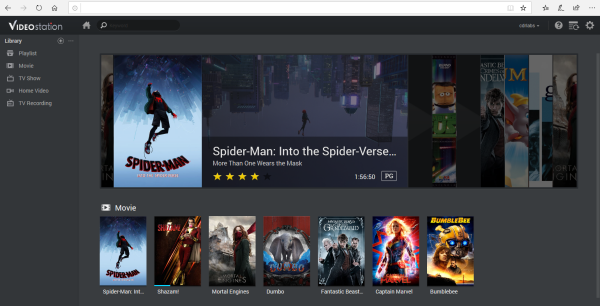
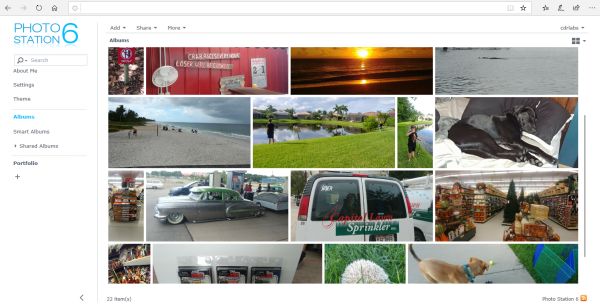
Synology also offers a number of mobile apps for both the iOS and Android platforms. I installed DS file, DS photo and DS video on my Android phone and was impressed by the quality and ease of use of these apps. I was able to upload and access files stored on the NAS, manage my photos and even watch movies on my phone.
The test system used in this review is equipped with an Intel Core i7-6700K CPU, GIGABYTE GA-Z170X-UD3 motherboard, 32GB (16GB x 2) of Crucial Ballistix Sport LT DDR4 memory, Samsung 960 PRO 512GB SSD and a GIGABYTE GeForce GTX 1060 WINDFORCE OC 6G graphics card. For the operating system, I installed a fresh copy of Windows 10 Enterprise.
To test the performance of the Synology DS620slim, I ran a series of benchmarks using CrystalDiskMark 3.0, ATTO Disk Benchmark 2.46, Iometer and the Intel NAS Performance Toolkit. The tests were first run using four WD Black 500GB hard drives configured as RAID 0, 10 and 6 volumes as well as a pair of Seagate IronWolf 110 480GB NAS SSDs that were used for caching. The DS620slim was connected to the computer using CAT6 ethernet cables and a gigabit Cisco switch. Unless otherwise noted, SSD caching has been enabled.
CrystalDiskMark 3.0:
First, I ran a few quick tests using CrystalDiskMark. This benchmark tool measures the performance of a storage device by testing its sequential read and write speeds as well as its random read and write speeds using blocks 4KB and 512KB in size.
According to Synology, the DS620slim is able to read at 226 MB/s and write at 198 MB/s when both networks ports are bonded. Using only one of the gigabit network ports, the NAS was able to read and write at about 116 MB/s.
Thanks to its hardware encryption engine, the DS620slim also performed equally well when doing encrypted file transfers. Once again, it was able to read and write at about 116 MB/s.
ATTO Disk Benchmark 2.46:
I also used ATTO Disk Benchmark to test the DS620slim's sequential read and write speeds. The tests are run using blocks ranging in size from 0.5KB to 8192KB and the total length set to 32MB and 256MB.
The DS620slim's performance was about the same when tested with ATTO. With the four hard drives in a RAID 6 array, the unit topped out at about 116 MB/s when both reading and writing.
Iometer:
Next, I ran a series of tests using Iometer. This tool can be configured to benchmark a number of things. In this case, I used it to measure the DS620slim's sequential read and write speeds using blocks ranging from 512B to 2MB in size. The tests were run using random bytes and a queue depth of 3.

The DS620slim's sequential read performance varied a bit when tested with Iometer. While it was able to read at more than 111 MB/s when using RAID 0 and RAID 10, its read speed topped out at only 100 MB/s when configured for RAID 6.
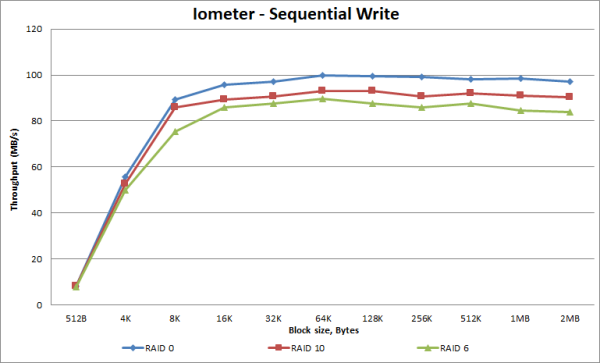
The RAID configuration also had an impact on the DS620slim's sequential write performance. The unit was able to write at nearly 100 MB/s when configured for RAID 0, but was limited to about 89 MB/s when using RAID 6.
Intel NAS Performance Toolkit:
The Intel NAS Performance Toolkit (Intel NASPT) is a file system exerciser and analysis tool designed to enable performance comparisons between network attached storage (NAS) devices. Intel NASPT focuses on user level performance using real world workload traces gathered from typical digital home applications: HD video playback and record, data backup and restore utilities, office productivity applications, video rendering/content creation, and more.
The DS620slim reached some respectable speeds when streaming HD video and copying large files to and from the server. As with other NAS devices though, its transfer rates dropped considerably when creating content and copying directories full of small files to the NAS.
Like most of Synology's newer NAS devices, the DS620slim offers support for their SSD caching technology. With excellent random access, a SSD cache can accelerate the performance of volumes and iSCSI LUNs, reduce the latency of the random write operations, and also greatly reduce any impact on the performance of other data transfers.
To use this feature, you need to install at least one SSD in your NAS. Thankfully, the DS620slim that Synology sent us came equipped with a pair of Seagate IronWolf 110 480GB NAS SSDs which let me create a read-write cache and mount it on the main RAID 6 volume.


From within the Storage Manager you can view the status of the SSD cache. In addition to cache usage, you can monitor things like the hit rate.

To test the performance of the SSD cache, I ran a series of tests using Iometer. As I mentioned before, this tool can be configured to benchmark a number of things. This time around, I used it to measure the DS620slim's random read speed and the number of operations per second using blocks ranging from 512B to 2MB in size. The tests were run using random bytes and a queue depth of 3.
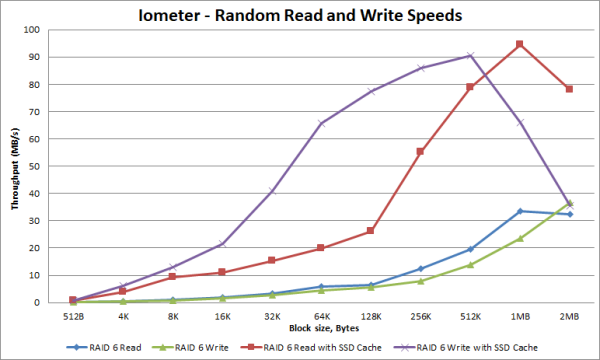
The DS620slim did fairly well when doing random reads and writes. With the SSD cache disabled, it was able to read at 33 MB/s and write at about 36 MB/s. With the cache enabled, these numbers jumped considerably. In one case, the random write speed increased by nearly 80 MB/s.

Here too, you can see the benefit of having an SSD cache. In our tests, the number of IOPS jumped from about 148 up to 1424 when randomly writing 4K blocks. This performance advantage tapers off as the block size gets bigger, but even with 64K blocks, the number of IOPS was still 14x higher with the cache enabled.
Final Thoughts:
The Synology DiskStation DS620slim is a great choice for anyone looking for a compact, yet powerful, 6-bay NAS for for their home or small business. Equipped with an Intel Celeron J3355 dual-core 2.0 GHz processor, 2GB of DDR3 RAM and an AES-NI hardware encryption engine, this mini-sized NAS delivers great performance as well as a multitude of features for both home and office environments. Along with an easy to use web interface, the DS620slim offers centralized, cross platform storage and backups, cloud synchronization, media streaming with 4K video transcoding, SSD caching and remote access via Synology's QuickConnect service.
As far as performance goes, the DS620slim wasn't the fastest multi-bay NAS to come through the 'Labs. Nevertheless, it performed relatively well throughout our tests, reading and writing at more than 116 MB/s using only a single NIC. The SSD cache also gave the DS620slim 's random read and write performance a considerable boost, increasing, in some cases, the number of IOPS by more than 16x.
The DS620slim is available now and can be purchased from online retailers like Amazon and Newegg for about $452.

Highs:
- Dual-core Intel Celeron processor with AES-NI encryption engine
- Six 2.5-inch hot-swap drive bays
- Supports SHR, RAID 0, 1, 5, 6, 10, JBOD and basic disk configurations
- Cross-platform file sharing and synchronization
- Dual Gigabit Ethernet ports
- USB 3.0 expansion ports
- Easy to use web interface
- Remotely accessible from web browsers and mobile devices
- Cloud synchronization
- Multimedia streaming with 4K video transcoding
- Supports SSD caching
- Quiet operation
- Reasonably priced
- Two year warranty
Lows:
- Maximum capacity lower than NAS devices with 3.5-inch hard drives
